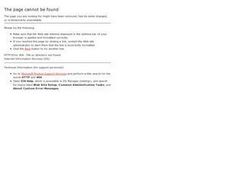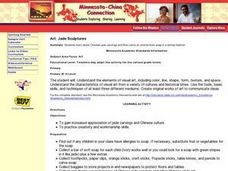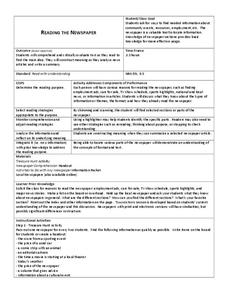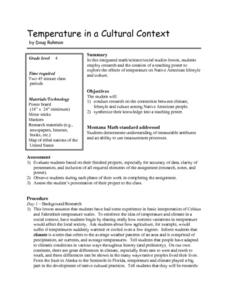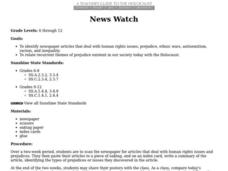Curated OER
A Statistical Study of the Letters of the Alphabet
Students gather appropriate information for simple statistical analysis. Then they will calculate probability working with a piece of literature that makes this instructional activity ideal for teaching across the whole curriculum.
Curated OER
Digestive System, a Kinesthetic Lesson
Young scholars actively act out an aspect of the digestive tract on two parallel strips of tape on the floor 3-4 feet apart and width of classroom which represent the digestive tract.
Curated OER
Minnesota-China Connections: Jade Sculptures
Students study Chinese jade carvings and then carve an animal from soap in a similar fashion.
Curated OER
Drawing Political Cartoons
Students draw political cartoons. In this editorial cartoons lesson, students discover the history of the cartoons in America, analyze some cartoons, and then draw their own cartoons that make social statements.
Curated OER
Logic and Proof Writing
Students define inductive and deductive reasoning and write two column proofs. In this geometry lesson, students analyze arguments and draw conclusion. They define steps necessary to arrive at the correct answer when completing proofs.
Curated OER
Reading the Newspaper
Students read the newspaper. In this newspaper instructional activity, students become familiar with the various parts of a newspaper. They read specific parts, highlight important information and summarize what they read.
Curated OER
1984
Learners read 1984, noting the potential dangers of government. They keep private diaries to parctice freedom of expression. They create political cartoons for a secret publication and design posters and T-shirts with warnings on them.
Curated OER
Understanding Islam
Students discover the religion of Islam by reading about it and answering questions. They examine the history and development of the religion. They finally analyze what happen to the religion in the future.
Curated OER
Temas contraversiales del mundo hispanohablante:Controversial Themes of the Hispanic World
Eleventh graders brainstorm controversial themes of Spanish-speaking countries. They read articles written in Spanish. They discuss the articles, practicing their Spanish speaking skills. Students conduct research and design a...
Curated OER
Temperature in a Cultural Context
Fourth graders investigate the effects of temperature on Native American lifestyle and culture. In small groups they conduct research on cultural practices showing a connection to the climate and create a poster displaying their...
Curated OER
Recycling for Raptors
Young scholars write persuasive letters in support of the Recycling for Raptors campaign. They review raptor groups and names and categorize the raptor species and the groups which they belong. They research businesses, schools, and...
Curated OER
Children's Literature Across the Curriculum Ideas-The Wind Blew
Young scholars read The Wind Blew by Pat Hutchins. They complete a variety of cross-curricular activities surrounding the study of wind and weather. Included are reading, art, math, science, writing, social studies, and library connections.
Curated OER
News Watch
Students examine newspaper articles that deal with human rights issues, prejudice, ethnic wars, antisemitism, racism, and inequality.
Curated OER
Our Geometric World
Third graders explore the attributes of polygons. In this geometric shapes lesson, 3rd graders review quadrilaterals, squares, rectangles, triangles, pentagons, hexagons, and octagons in order to create hanging polygons. Students then...
Curated OER
What Do We Share?
Seventh graders compare and contrast information about differences and similarities in communities.
Curated OER
Bag Lunch
Students rate foods as safe or unsafe and follow rules for food safety to make them safer.
Curated OER
Artist in Schools Program
Young scholars explore the medium of watercolor paints. They observe basic watercolor painting techniques (such as wet-on-wet, wet-on-dry and dry-on-dry). Then students experiment with these techniques on small squares of watercolor paper.
Curated OER
Cooking Terms - Level II
Students complete cooking terms with partners at their tables with the help of a foods classroom text.
Curated OER
Letters from Rifka
Learners read Karen Hesse's book "Letters from Rifka" and explore how it presents the experiences of a Russian immigrant to America. They research and write reports on the experiences of various immigrants from different cultures, keep...
Curated OER
What's In The Forest?
Students examine forest food chains and create a forest habitat in the classroom. They are introduced to the concept of interdependence in Nature. They define a simple forest food chain and develop inquiry process skills.
Curated OER
Everyone Knows It's Windy
Students create an anemometer, an instrument that measures wind speed.
Curated OER
You Are There: Television News Reports on Apartheid
Students, in groups, research apartheid and its effects on South Africa. They present their information to the class.
Curated OER
Get to Know Your City
Third graders research the history of their home city and how it's development was influenced by different groups of people. They present their research information to the class.
Curated OER
Changes in the Community
Third graders examine and describe a series of primary sources (mostly photographs) to observe and analyze changes over time. The focus is on the local community. The local community might be a city, township, county or surrounding area.


